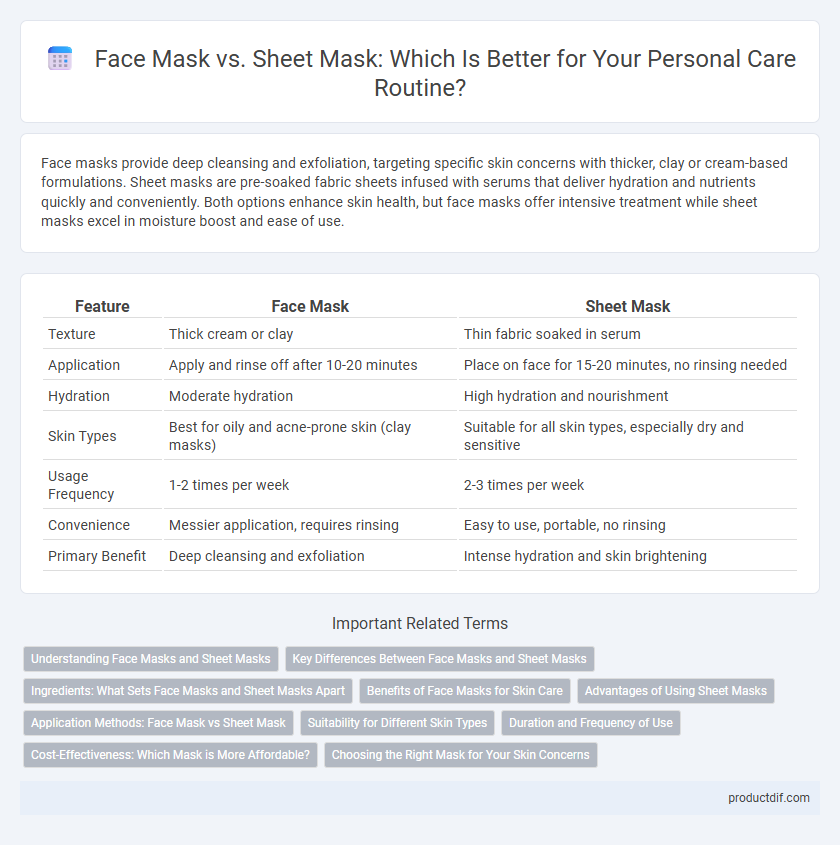Face masks provide deep cleansing and exfoliation, targeting specific skin concerns with thicker, clay or cream-based formulations. Sheet masks are pre-soaked fabric sheets infused with serums that deliver hydration and nutrients quickly and conveniently. Both options enhance skin health, but face masks offer intensive treatment while sheet masks excel in moisture boost and ease of use.
Table of Comparison
| Feature | Face Mask | Sheet Mask |
|---|---|---|
| Texture | Thick cream or clay | Thin fabric soaked in serum |
| Application | Apply and rinse off after 10-20 minutes | Place on face for 15-20 minutes, no rinsing needed |
| Hydration | Moderate hydration | High hydration and nourishment |
| Skin Types | Best for oily and acne-prone skin (clay masks) | Suitable for all skin types, especially dry and sensitive |
| Usage Frequency | 1-2 times per week | 2-3 times per week |
| Convenience | Messier application, requires rinsing | Easy to use, portable, no rinsing |
| Primary Benefit | Deep cleansing and exfoliation | Intense hydration and skin brightening |
Understanding Face Masks and Sheet Masks
Face masks provide deep cleansing and targeted treatment with ingredients like clay, charcoal, or hydrating gels tailored to specific skin concerns. Sheet masks are pre-soaked fabric sheets infused with serums containing hyaluronic acid, vitamin C, or peptides for quick hydration and brightening effects. Both mask types enhance skin health but differ in application, texture, and duration, making them suitable for varied skincare routines.
Key Differences Between Face Masks and Sheet Masks
Face masks typically come in creamy, clay, or gel forms designed for deep cleansing, exfoliation, or hydration, whereas sheet masks are fabric sheets soaked in serum to deliver concentrated ingredients directly to the skin. Face masks require application and removal after a set time, offering intensive treatments tailored for specific skin concerns, while sheet masks are single-use, mess-free, and enhance skin moisture and glow with minimal effort. The choice between the two depends on individual skin type, desired results, and convenience preferences.
Ingredients: What Sets Face Masks and Sheet Masks Apart
Face masks often contain concentrated active ingredients such as clay, charcoal, or exfoliating acids designed to deeply cleanse and treat the skin in targeted sessions, while sheet masks are typically infused with hydrating and soothing elements like hyaluronic acid, aloe vera, and botanical extracts for immediate moisture and nourishment. The formulation differences are driven by their delivery methods: face masks dry and set on the skin to enhance ingredient absorption, whereas sheet masks maintain a moist environment, allowing slower, more consistent nutrient release. Consumers seeking intensive skin treatment might favor face masks for their potent ingredients, whereas those prioritizing hydration and convenience often choose sheet masks.
Benefits of Face Masks for Skin Care
Face masks provide deep cleansing and intense hydration, helping to unclog pores and remove impurities for clearer skin. They often contain concentrated ingredients like antioxidants and vitamins, which promote skin renewal and improve texture. Regular use of face masks can reduce inflammation, enhance elasticity, and deliver targeted treatments for specific skin concerns such as acne or dryness.
Advantages of Using Sheet Masks
Sheet masks provide a highly concentrated delivery of active ingredients that penetrate the skin more effectively compared to traditional face masks. Their pre-soaked design ensures even application and minimizes mess, making them convenient for quick skincare routines. Enhanced hydration and improved absorption result in immediate skin plumping and a radiant complexion, ideal for boosting skin health efficiently.
Application Methods: Face Mask vs Sheet Mask
Face masks typically require manual application using fingers or a brush, allowing customized coverage and targeted treatment on skin areas needing extra care. Sheet masks are pre-soaked fabric sheets applied directly to the face, delivering concentrated serums evenly without drying time. Both masks enhance skin hydration and nourishment but differ in application convenience and precision.
Suitability for Different Skin Types
Face masks offer customizable formulations that cater to various skin concerns, making them suitable for oily, dry, sensitive, and combination skin by targeting specific issues like hydration, exfoliation, or oil control. Sheet masks, typically infused with hydrating serums, are ideal for dry and sensitive skin due to their gentle, occlusive nature that locks in moisture without irritation. Choosing between a face mask and a sheet mask depends on individual skin type and needs, with face masks providing flexibility in treatment intensity and sheet masks delivering consistent, soothing hydration.
Duration and Frequency of Use
Face masks typically require 10 to 20 minutes per application and are used 1 to 2 times per week to provide deep cleansing or hydration. Sheet masks are designed for shorter use, around 15 to 30 minutes, and can be applied more frequently, often 2 to 3 times per week, for consistent moisturizing and brightening effects. Both mask types should not be left on longer than recommended to avoid skin irritation or dryness.
Cost-Effectiveness: Which Mask is More Affordable?
Face masks, typically sold in jars or tubes, offer more application uses per container compared to single-use sheet masks, making them generally more cost-effective over time. Sheet masks, though convenient and pre-soaked with serum, tend to be pricier per use due to their disposable nature and packaging. Budget-conscious consumers often find traditional face masks to provide better value without compromising skincare benefits.
Choosing the Right Mask for Your Skin Concerns
Face masks and sheet masks serve different skincare needs, with face masks typically offering deeper exfoliation and targeted treatments for acne, dullness, or aging, while sheet masks provide hydration and soothing benefits ideal for sensitive or dry skin. Selecting the right mask depends on your specific skin concerns: clay or charcoal masks are effective for oily and acne-prone skin, whereas sheet masks infused with hyaluronic acid or aloe vera are optimal for hydration and calming irritated skin. Understanding your skin type and goals ensures optimal results from either face mask or sheet mask applications.
face mask vs sheet mask Infographic

 productdif.com
productdif.com